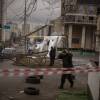When MIT student Artem Laptiev spoke with Morning Edition hosts Paris Alston and Jeremy Siegel last week, he said that Ukrainian students on campus felt “helpless” watching in terror as their home country was invaded by Russia. A week later, he is calling on local universities to do more.
“We have to emphasize that what academic institutions around the U.S. are doing right now is not nearly enough,” Laptiev, who is studying artificial intelligence, said in an interview with Alston and Siegel at MIT.
He praised MIT’s quick response last week to cut ties to a high-tech campus partnership with the Russian government. But he says universities should take additional steps, such as to make public statements in support of Ukraine, expose any information about funding and ties to Russia-related projects, and provide resources to the community about how they can help.
Most of all, he said that he wants institutions to “support their Ukrainians on campus while they fight for their country.”

Laptiev is from Kharkiv, a city on the frontlines of bombing and fighting in Ukraine. He says his parents and sister are safely out of the country, but the rest of his family and friends “are still in danger.” The kindergarten that his sister attends was bombed yesterday. He’s had to watch from afar as his city burns.
“I can only imagine how many of the people that I grew up with and I've seen in these villages are not alive,” he said.
Many of Laptiev's friends have stayed in Ukraine to fight. His science major friends are building Molotov cocktails. His computer science friends are helping the Ukrainian army with cyber warfare.
“A lot of my friends are picking up arms, [they’re] people who’ve never held a gun before — they go out and they volunteer because they have to fight for their land, for their freedom,” he said.
Laptiev says he is still not sleeping well, but he’s doing everything he can to support his home country remotely from Cambridge.
“This is something that has to unite every Ukrainian and also every person in the world to get together and do something about this right now at this moment,” he said. “And that's why we just work 100 percent of our time.”









